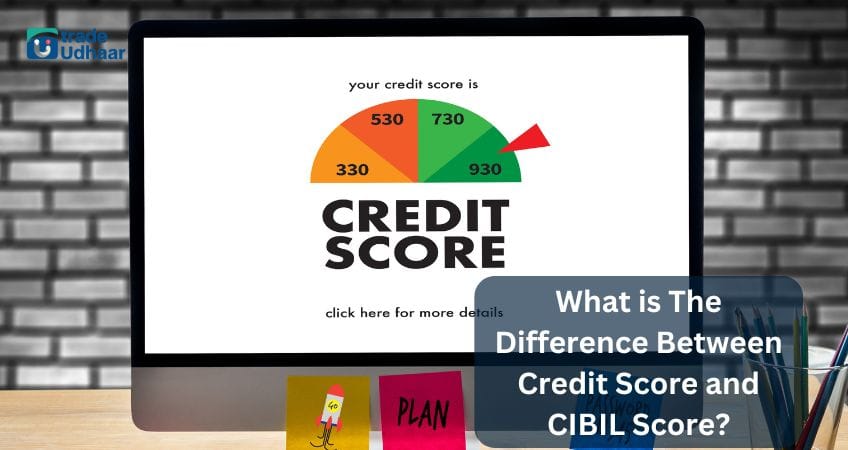What is The Difference Between Credit Score and CIBIL Score?

Credit score and CIBIL score are commonly used interchangeably, although they truly mean distinct things. A credit score is a numerical measure of an individual's creditworthiness that considers payment history, credit use, and credit history duration. The term CIBIL score, on the other hand, refers to the credit score supplied by the Credit Information Bureau (India) Limited (CIBIL), one of India's top credit agencies. While both scores measure creditworthiness, the CIBIL score is commonly utilised by lenders in India to establish an individual's eligibility for credit products.
What is a Credit Score?
A credit score is a three-digit figure that shows how likely you are to repay borrowed funds. It's similar to a report card for your borrowing history. Lenders use it to determine if you qualify for a loan, such as a mortgage or a vehicle loan, and what interest rate you will pay. Higher scores indicate you're more likely to get approved for loans with better terms. Your credit score is calculated using your credit history, which monitors your previous borrowing and repayment activity. Your bill payments, debt size, and length of time you've had credit accounts are all important considerations.
You may improve your credit score by managing it properly, such as paying payments on time and staying out of debt. This can save you money in the long term by qualifying for loans with reduced interest rates. A strong credit score can also help you qualify for greater loan amounts, allowing you to tackle larger projects or investments. A strong credit score is also useful when applying for specific jobs or renting an apartment.
What is a CIBIL Score?
Credit Information Bureau (India) Limited (CIBIL) produced the CIBIL score, which is a specialized credit score for India. It functions similarly to a standard credit score, ranging from 300 to 900, with a higher number signifying more creditworthiness. CIBIL calculates your score using your credit report, which includes information about your borrowing history, such as loans and credit cards. Your CIBIL score is influenced by several factors, including payment history, credit use, and credit inquiries.
A high CIBIL score, like a good credit score, boosts your chances of getting a loan and gets you better interest rates. In India, a score of more than 750 is typically regarded optimal. Maintaining a good CIBIL score through appropriate credit practices is critical for obtaining loans and properly managing your money. Your credit report should be reviewed on a regular basis to verify that all of the information is correct and up to date. Taking prompt action to address any errors might help you enhance your score. Positive credit conduct is essential for achieving and keeping a good CIBIL score.
Key Differences Between Credit Score and CIBIL Score
Credit scores and CIBIL scores both measure an individual's creditworthiness, although they have significant distinctions. Understanding these important distinctions is critical for anybody negotiating the complexities of credit evaluation in both the global and Indian environment.
- A credit score is a numerical representation of a person's creditworthiness on a worldwide scale, derived using characteristics such as payment history, credit use, and duration of credit history. FICO and VantageScore are popular methodologies for calculating credit ratings.
- In contrast, a CIBIL score is unique to India and is supplied by the Credit Information Bureau (India) Limited (CIBIL). It assesses an individual's creditworthiness in the Indian financial system, taking into account characteristics such as credit history, repayment habits, and outstanding debt.
- The score ranges also vary. Credit scores normally vary between 300 and 850, with higher scores indicating greater creditworthiness. In contrast, CIBIL scores vary between 300 and 900, with a higher number indicating a more creditworthy individual.
- While credit ratings are extensively utilized around the globe, CIBIL scores are unique to the Indian financial scene. Monitoring both scores is critical for overall financial health since they influence loan approvals, interest rates, and other financial decisions.
Importance of Monitoring Credit Scores and CIBIL Scores
Monitoring both credit and CIBIL scores is critical to keeping a good financial profile. These scores play an important role in establishing creditworthiness, impacting loan acceptance and terms, as well as other financial goods.
Regular monitoring keeps persons informed about their present situation, allowing for proactive management and smart decision-making. Individuals who keep a careful eye on their credit and CIBIL ratings are more likely to notice any inconsistencies or unlawful activity. Identity theft and fraudulent activity can have a major influence on credit scores, and early identification allows for timely corrective action.
Consistent monitoring helps to find areas for improvement. Individuals who understand the elements that influence these ratings might take proactive steps to improve their financial situation. These ratings improve with timely payments, appropriate credit use, and debt resolution. Financial firms frequently evaluate loan applications using both global credit scores and CIBIL scores. A good trend in these ratings might lead to better terms, such as reduced interest rates and bigger loan limits.
Monitoring credit and CIBIL scores is an essential part of financial well-being. It enables people to make educated decisions, protect themselves from possible hazards, and actively construct a good credit profile, resulting in increased financial stability and access to better financial possibilities.
How to Check Your Credit Score and CIBIL Score?
Checking your credit score and CIBIL score is a straightforward process, and it's crucial for staying informed about your financial health. Here's a step-by-step guide on how to check both scores:
How to Check Your Credit Score?
- Choose a Credit Reporting Agency: Select a reputable credit reporting agency. Common ones include Equifax, Experian, and TransUnion. You can access your credit report for free once a year from each of these agencies.
- Visit the Agency's Website: Go to the official website of the chosen credit reporting agency. Look for the section that allows you to request your credit report.
- Provide Personal Information: Enter the required personal information, including your name, address, social security number, and date of birth. Some agencies may ask for additional verification information.
- Request Your Credit Report: Follow the prompts to request your credit report. You may need to answer security questions or provide details about your credit history.
- Review Your Credit Report: Once you receive your credit report, carefully review it for accuracy. Check for any discrepancies or unauthorized activities.
Checking Your CIBIL Score:
- Visit the CIBIL Official Website: Go to the official website of Credit Information Bureau (India) Limited (CIBIL) at www.cibil.com
- Select the "Get Your CIBIL Score" Option: Look for the option to obtain your CIBIL score. It is usually prominently displayed on the website.
- Fill in Personal Details: Provide the necessary personal information, including your name, date of birth, PAN card number, contact details, and more.
- Answer Verification Questions: CIBIL may ask you some verification questions related to your credit history to ensure the security of your information.
- Verify Your Identity: Authenticate your identity through the provided options, such as OTP (One-Time Password) sent to your registered mobile number or email.
- View Your CIBIL Score: After successful verification, you'll be able to view your CIBIL score and credit report. Review the details for accuracy and take note of your credit score.
Regularly reviewing your credit and CIBIL scores is a proactive way to be informed about your financial situation and solve any difficulties as soon as possible. Remember that monitoring these scores promotes prudent financial management and allows you to make educated credit-related decisions.
Tips for Improving Credit and CIBIL Scores
Improving your credit and CIBIL ratings is critical to obtaining favorable financing arrangements. Here are some practical ways for improving both scores:
- Make all of your bills, loans, and credit card payments on time. Regular payments have a strong favorable influence on both credit and CIBIL scores.
- Keep your credit card balances modest in relation to your credit limit. Aim for a credit usage ratio of less than 30% to demonstrate appropriate credit management.
- Maintain a varied range of credit kinds, including credit cards, installment loans, and retail accounts. A well-balanced blend can improve your results.
- Check your credit report on a regular basis for any inaccuracies or anomalies. To prevent having your results lowered, instantly dispute any errors.
- Limit the quantity of fresh credit applications. Multiple questions in a short period of time might be seen as dangerous conduct, which can lower your results.
- If you have several unused credit accounts, consider closing them. This can simplify your financial profile and possibly boost your scores.
- Work on repaying any outstanding bills. Reducing your overall debt burden improves your creditworthiness.
- The duration of your credit history affects your ratings. Keep previous accounts open, even if the balance is nil, to indicate a longer credit history.
FAQs: Credit Score and CIBIL Score
Q. What is a credit score, and why is it important?
Ans. A credit score is a numerical evaluation of your creditworthiness. Lenders use it to determine the risk of lending. A strong credit score leads to better lending conditions and financial prospects.
Q. How is a CIBIL score different from a credit score?
Ans. The Credit Information Bureau (India) Limited provides the CIBIL score, a particular credit score used in India. It assesses creditworthiness inside the Indian financial system.
Q. Can I check my credit score for free?
Ans. Yes, several credit reporting organizations give one free credit report every year. Requesting your report helps you to keep track of your credit status and discover any issues.
Q. How often should I check my CIBIL score?
Ans. Check your CIBIL score at least once a year, or before making any important financial choices. Monitoring aids in the detection of inaccuracies, the prevention of identity theft, and the maintenance of a positive credit profile.





